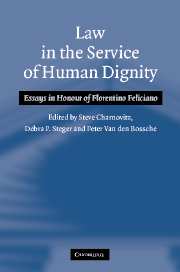Book contents
- Frontmatter
- Contents
- List of contributors
- Preface
- Biographical note
- List of abbreviations
- PART I Reflections on the contributions of Florentino Feliciano to international law
- PART II Insights into the World Trade Organization
- 5 Justice Feliciano and the WTO environmental cases: laying the foundations of a ‘constitutional jurisprudence’ with implications for developing countries
- 6 International trade law, human rights and theories of justice
- 7 Developing countries and the international trading system
- 8 North–South issues of foreign direct investments in the WTO: is there a middle-of-the-road approach?
- 9 The participation of developing countries in WTO dispute settlement and the role of the Advisory Centre on WTO Law
- 10 Reform of the WTO dispute settlement system: what to expect from the Doha Development Round?
- 11 Interpretation and Application of WTO Rules: Florentino Feliciano and the First Seven
- 12 Dispute settlement in the WTO: on the trail of a court
- 13 A proposal to introduce an Advocate General's position into WTO dispute settlement
- 14 Arbitration at the WTO: a terra incognita to be further explored
- 15 The challenges to the legitimacy of the WTO
- 16 The World Trade Organization after Cancún
- PART III The changing landscape of investment arbitration
- PART IV New challenges in international adjudication
- Bibliography of works by Florentino Feliciano
- Index
9 - The participation of developing countries in WTO dispute settlement and the role of the Advisory Centre on WTO Law
from PART II - Insights into the World Trade Organization
Published online by Cambridge University Press: 29 July 2009
- Frontmatter
- Contents
- List of contributors
- Preface
- Biographical note
- List of abbreviations
- PART I Reflections on the contributions of Florentino Feliciano to international law
- PART II Insights into the World Trade Organization
- 5 Justice Feliciano and the WTO environmental cases: laying the foundations of a ‘constitutional jurisprudence’ with implications for developing countries
- 6 International trade law, human rights and theories of justice
- 7 Developing countries and the international trading system
- 8 North–South issues of foreign direct investments in the WTO: is there a middle-of-the-road approach?
- 9 The participation of developing countries in WTO dispute settlement and the role of the Advisory Centre on WTO Law
- 10 Reform of the WTO dispute settlement system: what to expect from the Doha Development Round?
- 11 Interpretation and Application of WTO Rules: Florentino Feliciano and the First Seven
- 12 Dispute settlement in the WTO: on the trail of a court
- 13 A proposal to introduce an Advocate General's position into WTO dispute settlement
- 14 Arbitration at the WTO: a terra incognita to be further explored
- 15 The challenges to the legitimacy of the WTO
- 16 The World Trade Organization after Cancún
- PART III The changing landscape of investment arbitration
- PART IV New challenges in international adjudication
- Bibliography of works by Florentino Feliciano
- Index
Summary
My first opportunity to meet Justice Florentino Feliciano was when he was first appointed as a Member of the Appellate Body of the World Trade Organization, and I gave him a lift. Contemporary music was playing on my car radio. I asked him if he preferred to listen to another type of music. He asked me if, by any chance, I had Gregorian chants. It was my lucky day.
As a Filipino and as a member of the Philippine bar, I had known of Justice Florentino Feliciano before I had the opportunity to meet him. When I started my career as an apprentice in a law firm in the Philippines, Justice Feliciano was a partner in another law firm bearing his name. My mentors in the law firm were his former associates in that other law firm. They spoke of ‘Toy’ in hushed tones, almost bordering on reverence. Many years later, I had the opportunity to meet Justice Feliciano face to face and to get to know him more. I then realized why my mentors spoke of him in that manner.
Etched in stone in the main hall of the law school in the Philippines where Justice Feliciano obtained his first degree in law are the following words:
The business of a law school is not sufficiently described when you merely say that it is to teach law or to make lawyers. It is to teach law in the grand manner and to make great lawyers.
- Type
- Chapter
- Information
- Law in the Service of Human DignityEssays in Honour of Florentino Feliciano, pp. 90 - 102Publisher: Cambridge University PressPrint publication year: 2005



